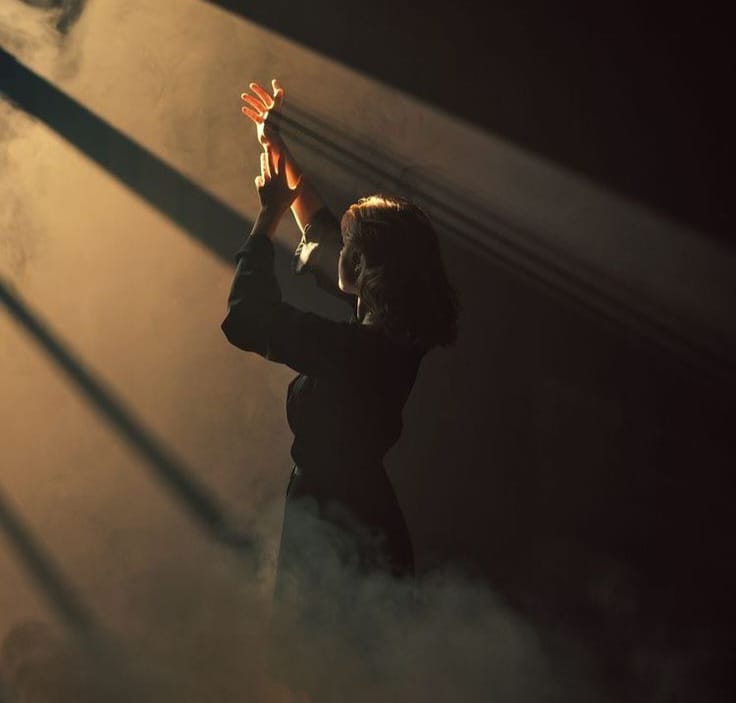There comes a moment in many lives, especially in a woman, when clarity doesn’t arrive softly, like dawn breaking gently over a quiet horizon. Sometimes clarity crashes in like a storm. It erupts after long stretches of internal chaos, when life begins to feel like a puzzle with missing pieces. In those moments, you feel like a headless chicken, frantically searching for direction, as if running through fog, weighed down by indecision, fatigue, pain, or sheer disillusionment. The disarray can feel so relentless that it fells like you are drowning, as if you’re screaming beneath the surface and no one hears you. And then, from that void, a yearning begins to rise slowly and quietly, but with the weight of lifetimes the yearning for a saviour.
We’re told to be strong, to be self-sufficient, to “boss up” and keep it all together. But there’s a limit to even the most hardened independence. When that limit is reached, a question begins to bloom in the hidden corners of the heart, “Can someone else carry this for a while?” “Can someone see me, really see me, and say”, “You don’t have to do this alone”?
The Anatomy of Chaos
Contrary to the dramatic depictions on screen, chaos is not always loud. Often, it is heartbreakingly silent. It seeps into your life like a slow leak, staining everything over time. It lives in trembling hands, stammered words, missed calls, cancelled plans, and the unspoken grief of wanting to be held but not knowing how to ask. In this quiet unravelling, what you once wore like armour, your strength, your independence, your emotional resilience begins to feel like a weight too heavy to carry.
Hyper-independence, often mistaken for empowerment, can sometimes become its own prison. It convinces you that asking for help is failure, that needing someone is weakness. But isn’t that idea flawed at its core? Aren’t we, by nature, social beings wired for connection, support, and community? What is the point of society if it only shows up when the winds are favourable? If its hands reach out to you only during birthday parties and brunches, but not during breakdowns?
The world might yell, “Don’t fall for the saviour trap.” And maybe there’s truth in that. But I ask, Why not want help when you’re spiraling? Why not want someone to anchor you when you’re drifting?
Clarity Through Cluelessness
Ironically, clarity does not bloom in moments of triumph. It begins in the dark, through cluelessness, through silence, through the unbearable discomfort of not knowing. We are raised to have answers, to build plans, to chase goals. But no one prepares us for the blank chapters, those terrifying periods when everything stands still and nothing makes sense. When even your own voice sounds unfamiliar in your head.
It is within these painful stretches of naivety and surrender that a woman often uncovers her deepest truth: clarity is not a lightning bolt that strikes from above. It is a whisper that emerges slowly, after the storm has spent itself. It is born not in knowing, but in allowing. In embracing the very cluelessness, we were taught to fear.
The Rise of the Saviour Complex
And then comes the seduction, the allure of being rescued. The idea that someone could appear, hold your broken pieces, and make sense of it all. Not necessarily a hero with a sword, but someone who sees you in your mess and stays. Someone who doesn’t flinch when you cry. Someone who steadies the chaos not by solving it, but by simply standing still beside it.
This desire for a saviour is not childish. It is deeply human. We do not grow in isolation; we bloom in connection. We reach our emotional fullness through interaction, through being mirrored, witnessed, and loved. Popular culture, especially Bollywood, knows this emotional landscape all too well. And it is here, at the intersection of vulnerability and longing, that cinema builds its strongest fantasies.
Bollywood and the Fantasy of Rescue
For decades, Bollywood has mastered the narrative of emotional rescue. The female protagonist is not just falling in love; she is being saved from loneliness, poverty, broken homes and silent trauma. The male lead isn’t merely a romantic partner; he is the redeemer. He gives meaning to her suffering. He gives shape to her chaos.
And the audience, mostly women, watches with wet eyes and softened hearts. Because even the strongest among us, especially the strongest among us, crave softness. Crave the relief of no longer having to be the one who holds it all together.
Bollywood doesn’t just sell romance; it sells salvation. A song, a gaze, a dramatic entry, and suddenly the pain makes sense. That’s the formula. And it works because it taps into a secret truth we often carry with guilt: Sometimes, we want to be saved.
But What Happens After the Rescue?
Here lies the danger not in desiring connection, but in outsourcing your healing. In believing that someone else’s arrival is the cure. Because real life doesn’t unfold in song sequences. There is no final act where everything aligns under a rain-soaked kiss. The saviour, no matter how devoted, cannot quiet the chaos that lives inside you. That work is yours.
And this is the bittersweet truth many of us discover, the real rescue is internal. It is the quiet choice to wake up and try again. It is the trembling step forward when you want to retreat. It is forgiving yourself for not having it all together. Clarity doesn’t come from another’s presence; it comes from your own endurance through the fog.
Conclusion
So yes, maybe this is when women begin to seek saviours, when the ground beneath them shatters and the map they were following no longer makes sense. This isn’t weakness. This is simply being human.
But what we must begin to teach ourselves and each other is that while the saviour fantasy is understandable, it is not sustainable. Chaos is inevitable. We will break, we will lose our way. But clarity, as elusive as it may seem, is always possible.
Not through fantasy, not through waiting. But through walking, through trembling steps, heavy breaths, tear-streaked nights, until the fog finally lifts.
And if someone chooses to walk beside you during that journey not to save you, but simply to witness you that’s not Bollywood.
That’s life.


Very relatable & brutally honest!
thanks for info.